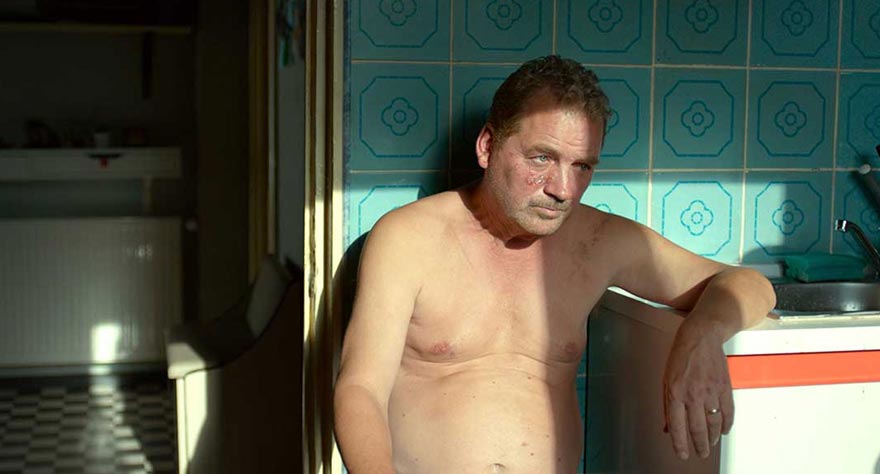
By exploring character-based mysteries rather than narrative ones, 'One Floor Below' provides a rich and rewarding experience.

By exploring character-based mysteries rather than narrative ones, 'One Floor Below' provides a rich and rewarding experience.
When discussing Romanian cinema, or more specifically the “New Wave” of minimalist, arthouse-friendly titles from this century (a wave that really isn’t that new anymore, given it’s over a decade old now), the word “slow” inevitably comes up in some form or another. With an emphasis on realism and letting scenes unfold through long, (usually) static takes, the apparent mundanity of what’s on screen ends up giving way to something thought-provoking and thematically rich. Whether it’s taking place in the country’s tumultuous past or its present day, the relatable and banal actions of characters provide a platform to explore personal, political and social ideas that delve well beyond the surface. These films are only “slow” in that their pacing isn’t what’s usually expected; “deliberate” would be a more accurate, and less reductive, description.
So it comes as no surprise that Radu Muntean’s One Floor Below is a very deliberately paced film, to the point where it might fly over some people’s heads. It starts with an innocuous act of eavesdropping: Business owner Patrascu (Teodor Corban) comes back home after taking his dog for a walk when he overhears an intense argument in the apartment below his. He listens in as Laura (Maria Popistasu) argues with Vali (Iulian Postelnicu), another tenant in the apartment. There’s a sound of a struggle and a scream from Laura before everything goes silent, and before Patrascu knows it Vali opens the door, catching him listening in. It’s an awkward moment for Patrascu, one he tries to forget about later that day until he sees police cars outside his building when he comes home from work.
Laura was found dead in her apartment with the police suspecting foul play, and while some directors might create a mystery over whether or not Vali did it, Muntean has different plans. The big question revolves around Patrascu instead, as he doesn’t divulge what he heard to police when they question him about Laura’s death. Without any hint of character motivation, Patrascu is more or less a blank slate for viewers to pin their assumptions and theories on. The only thing that’s obvious is his avoidance of anything related to Laura’s murder, shutting down the topic whenever his wife or son bring it up. But the hassle of trying to stay a silent witness gets worse for Patrascu once Vali starts involving himself in his life more and more, befriending family members and eventually asking Patrascu to help him out with a business matter.
It’s an enticing set-up, except Muntean seems intent on making his film a sort of inert thriller, focusing his time on things like Patrascu’s job as a bureaucratic navigator of sorts, helping people get their car registrations with little to no hassle. That’s what One Floor Below might look like at first blush, but it would be a mistake to interpret Muntean’s vast room for interpretation and reflection as nothing more than empty space. It’s a film that unfolds through gaps, to the point where its editing is so elliptical it’s easy to question basic facts: it’s never explicitly stated that Laura was murdered, and even then Muntean doesn’t make it clear that Vali killed her. Muntean’s omissions are blanks for viewers to fill in as they see fit, not holes in the story.
With so many films happy to withhold facts or delve into ambiguities, it’s easy to apply that same mode of interpretation on Muntean’s narrative, but with One Floor Below it might be a case of digging a little too deep. When Patrascu bumps into Laura’s sister in the apartment, trying to open her dead sibling’s overstuffed mailbox, it’s followed by Patrascu lambasting a friend for calling Laura a slut. Does Patrascu feel guilty about his silence after seeing Laura’s distraught sister, or is he just annoyed at the topic not going away? The real ambiguities of One Floor Below lie in its characters, not its story, which serves as a set-up for Muntean’s exploration of the reactions and fallout from Laura’s death. Patrascu, as a man who runs his own complicated business, finds himself inserted into a situation he has no grasp on, and in his attempts to maintain control he only finds it slipping out of his hands at a faster rate.
Teodor Corban’s performance is a low-key powerhouse in many ways, finding a perfect balance between a specificity that gives him an intimidating presence and an ability to hold back from revealing too much about what’s going on inside his head. Muntean pulls off a similar balancing act himself in his film’s construction, filming most of his scenes in lengthy, unbroken takes emphasizing the underlying tension between Patrascu and Vali. These scenes, especially when Vali starts showing up in Patrascu’s apartment to lend a hand, linger on the lulls in conversations, watching Patrascu try to get a handle on how to navigate himself out of a mess he inadvertently made himself a part of. Muntean has enough confidence in his premise and direction to simply present the situation, let viewers pick apart what’s raging underneath the surface and make their own conclusions about character motivations and psychology rather than what’s fact or fiction. And by creating the opportunity to navigate the murkier landscape of character rather than narrative, Muntean provides a more active and rewarding experience than One Floor Below’s conventional-sounding story implies.